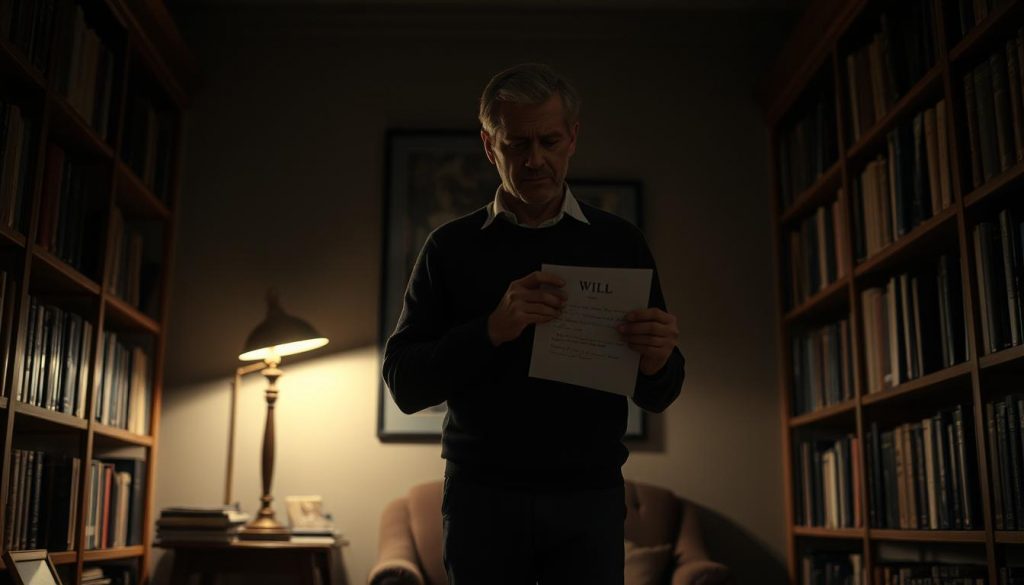Losing a spouse is a difficult experience, and updating your will might be the last thing on your mind. However, it’s crucial to ensure that your estate is managed according to your current wishes.
Reviewing and updating your will after a spouse’s passing is essential to reflect the changed circumstances. We understand the importance of securing your family’s assets and guiding you through the process.
We will explain the legal requirements and steps involved in updating your will, ensuring that your estate is managed according to your current wishes. It’s vital to look for certain things when altering your will following the death of your spouse or partner.
Key Takeaways
- Review your will to reflect changed circumstances after a spouse’s passing.
- Understand the legal requirements for updating a will.
- Secure your family’s assets by managing your estate according to your current wishes.
- Consider the steps involved in updating your will.
- Ensure your estate is managed according to your current wishes.
Understanding the Basics of Wills
Estate planning begins with a will, a legal document that outlines how your assets should be distributed after your death. It’s a fundamental aspect of ensuring that your wishes are respected and your loved ones are taken care of.
What is a Will?
A will, also known as a last will and testament, is a document that specifies how you want your estate to be handled after you pass away. It typically includes details about the distribution of your assets, such as property, money, and other possessions. A will usually names an executor who is responsible for carrying out the instructions you’ve left behind.

Importance of a Will in Estate Planning
Having a will is crucial for several reasons. Firstly, it ensures that your assets are distributed according to your wishes, rather than being decided by the state. This can provide peace of mind for both you and your loved ones. Secondly, a will can help reduce the likelihood of disputes among family members by clearly outlining your intentions. Lastly, it allows you to appoint guardians for any minor children, ensuring their well-being is protected.
- A will helps in distributing your assets as per your wishes.
- It reduces the potential for family conflicts.
- You can appoint guardians for your minor children.
Components of a Valid Will
For a will to be considered valid, it must meet certain criteria. These include being in writing, signed by you (the testator), and witnessed by two independent individuals. The witnesses must be present when you sign the document, and they must also sign it themselves. It’s also advisable to have your will reviewed by a legal professional to ensure it complies with the relevant laws and regulations.
Understanding these basics is essential before considering any changes to a will after a spouse’s passing. It lays the groundwork for making informed decisions about your estate planning.
Legal Framework Surrounding Wills in the UK
Understanding the legal framework surrounding wills in the UK is crucial for navigating the complexities of estate planning after a spouse’s passing. The UK’s legal system provides a structured approach to managing wills, ensuring that the rights of all parties are protected.
Key Legislation Governing Wills
The legal framework governing wills in the UK is primarily based on several key pieces of legislation. These include:
- The Wills Act 1837, which sets out the formal requirements for making a valid will.
- The Administration of Estates Act 1925, which deals with the distribution of the estate when there is no will or when the will does not cover the entire estate.
- The Inheritance and Trustees’ Powers Act 2014, which amends certain aspects of the law regarding inheritance and the powers of trustees.
These Acts collectively provide the foundation for understanding how wills are governed in the UK. It’s essential to be aware of these laws when considering making changes to a will or contesting its validity.

Recognising Validity and Potential Challenges
A will is considered valid if it meets certain criteria, including being in writing, signed by the testator, and witnessed by two independent witnesses. However, the validity of a will can be challenged under certain circumstances.
Challenges to a will can arise from various grounds, including:
- Lack of testamentary capacity: The testator did not have the mental capacity to make the will.
- Undue influence: The testator was coerced or manipulated into making the will.
- Improper execution: The will was not signed or witnessed correctly.
Recognising the potential for challenges is crucial in ensuring that a will is robust and less susceptible to disputes. In cases where a spouse seeks to alter a deceased partner’s will, understanding these legal nuances is vital.
As noted by legal experts, “The legal framework surrounding wills is designed to balance the testator’s freedom to dispose of their estate as they wish with the need to protect the rights of beneficiaries and dependents.”
“The law aims to respect the wishes of the deceased while ensuring fairness to all parties involved.”
In conclusion, the legal framework surrounding wills in the UK is complex and multifaceted. Understanding the key legislation and potential challenges to a will is essential for effective estate planning and for ensuring that the wishes of the deceased are respected.
The Role of the Executor
The executor plays a pivotal role in ensuring that the deceased’s wishes are carried out according to their will. This involves a series of responsibilities that are crucial for the smooth administration of the estate.
Responsibilities of an Executor
An executor’s duties are multifaceted, including:
- Managing the estate’s assets, ensuring they are distributed as per the will.
- Paying off debts and taxes owed by the estate.
- Communicating with beneficiaries and other relevant parties.
These tasks require a high level of organization and attention to detail to ensure that the deceased’s wishes are respected.
How Executors Manage the Will
Managing a will involves several key steps. Executors must first identify and gather all assets, then determine their value. They must also settle any outstanding debts or taxes. Finally, they distribute the remaining assets according to the will’s instructions.
This process can be complex, requiring executors to be diligent and thorough in their duties.
The Importance of Communication
Effective communication is vital in the role of an executor. Beneficiaries and other parties need to be kept informed about the progress of the estate administration. This helps to manage expectations and reduce potential conflicts.
We recommend that executors maintain open lines of communication, providing regular updates and being transparent about the processes involved.
Can a Spouse Change a Will After Death?
The death of a spouse often prompts the question: can the surviving partner modify the will? This is a complex issue, governed by specific legal principles in the UK.

Circumstances Under Which Changes Can Occur
In the UK, the general rule is that a will cannot be changed after the testator’s death. However, there are certain circumstances where adjustments can be made. For instance, if the deceased and their spouse had a mutual will, the surviving spouse may be able to make changes under specific conditions.
It’s essential to understand that any changes or amendments to a will after death are subject to legal scrutiny. The courts typically uphold the original will unless there are valid grounds for a challenge.
The Concept of Testamentary Freedom
Testamentary freedom refers to an individual’s right to dispose of their assets as they wish upon their death. This principle is fundamental to the law governing wills in the UK. However, this freedom is not absolute and can be subject to certain legal limitations and challenges.
For example, the Inheritance (Provision for Family and Dependants) Act 1975 allows certain individuals, including spouses, to claim against the estate if they believe they have not been adequately provided for.
Understanding testamentary freedom is crucial for anyone looking to amend a will or make a claim against an estate.
Implications of Jointly Owned Assets
Assets owned jointly by spouses, such as property or bank accounts, typically pass automatically to the surviving spouse upon death. This is known as the right of survivorship.
For assets held in joint tenancy, the surviving spouse becomes the sole owner, and the asset does not form part of the deceased’s estate. Therefore, it is not subject to the terms of the will.
If you’re considering updating your estate plan following the loss of a spouse, it’s advisable to review your current estate plan to ensure it remains relevant and effective.
Situations Where a Will Cannot Be Changed
When a spouse passes away, the terms of their will can sometimes be subject to change, but there are specific situations where alterations are not possible. The flexibility to alter a will after a spouse’s death is governed by various legal rules and provisions.

Reasons for Non-Modification
There are several scenarios where a will cannot be changed after the death of a spouse. One such instance is with mutual wills, which are designed to be binding and prevent changes after one spouse has passed away. Mutual wills are governed by specific rules that ensure the surviving spouse adheres to the agreed-upon terms.
Other reasons for non-modification include:
- Contractual obligations: If the will is part of a contractual agreement, changing it could breach the contract.
- Statutory restrictions: Certain laws may restrict changes to a will, especially if they involve trusts or other legal arrangements.
- Previous agreements: If there were prior agreements between spouses regarding the distribution of assets, these can limit the ability to alter the will.
Legal Protections for Beneficiaries
Beneficiaries named in a will are afforded certain legal protections to ensure their interests are safeguarded. These protections are crucial in preventing unjust changes to the will.
The legal protections include:
- Right to contest: Beneficiaries have the right to contest the will if they believe it has been altered unfairly or if they have been unduly influenced.
- Legal recourse: Beneficiaries can seek legal recourse if they feel their inheritance is threatened by potential changes to the will.
Understanding these protections is vital for both the surviving spouse and the beneficiaries, as it helps navigate the complexities of estate planning and ensures that the deceased’s wishes are respected.
Making a Claim Against a Will
In the UK, the legal system allows certain individuals to contest a will if they believe it is unfair or invalid. Contesting a will is a serious step that involves understanding the legal grounds and adhering to strict time limits.
Grounds for Contesting a Will
There are specific grounds on which a will can be contested. These include:
- Lack of testamentary capacity: The testator did not have the mental capacity to make a valid will.
- Undue influence: The testator was coerced or manipulated into making the will.
- Improper execution: The will was not signed or witnessed correctly.
- Lack of knowledge and approval: The testator did not understand or approve the contents of the will.
As noted by a legal expert, “Contesting a will on the grounds of undue influence requires evidence that the testator was subjected to pressure or coercion that affected their decisions regarding the will.”
“The burden of proof lies with the person contesting the will, and they must provide sufficient evidence to support their claim.”
Time Limits for Contesting a Will
There are strict time limits for contesting a will. In the UK, the general rule is that a claim must be made within six months from the date of the grant of probate. However, this time limit can be extended under certain circumstances, such as if the court permits an application to be made outside this period.
| Time Frame | Description |
|---|---|
| 0-6 months | Standard time limit for contesting a will from the date of grant of probate. |
| Beyond 6 months | Possible to contest with court permission, subject to certain conditions. |
It’s crucial to seek legal advice promptly if you are considering contesting a will to ensure that you comply with these time limits.
The Importance of Seeking Legal Advice
Legal guidance is essential for those looking to amend or understand a will after a spouse’s death. Estate planning can be complex, and seeking legal advice is often necessary to ensure that the deceased’s wishes are respected and that the legal obligations are met.
When to Consult a Solicitor
It’s advisable to consult a solicitor when you are dealing with the estate of a deceased spouse, especially if you are considering amending their will. A solicitor can provide clarity on the legal framework surrounding wills in the UK, including the implications of jointly owned assets and the rights of beneficiaries.
According to legal experts, “Seeking professional advice can help navigate the complexities of estate administration, ensuring that all legal requirements are met and potential disputes are minimized.”
“A solicitor can guide you through the process, ensuring that your actions are in line with the law and the deceased’s intentions.”
The Role of Legal Professionals in Estate Matters
Legal professionals play a crucial role in estate matters, providing guidance on the administration of the estate, the validity of the will, and any potential disputes that may arise. They can also assist in making a claim against a will if necessary.
| Role of Legal Professionals | Benefits |
|---|---|
| Guidance on Estate Administration | Ensures compliance with legal requirements |
| Validation of the Will | Confirms the will’s authenticity and legality |
| Dispute Resolution | Helps in resolving potential disputes among beneficiaries |
By seeking legal advice, individuals can ensure that they are handling the estate in accordance with the law and the deceased’s wishes. This not only provides peace of mind but also helps in avoiding potential legal complications.
Alternative Options: Trusts and Estates
Trusts offer a unique set of benefits that can complement or even replace traditional wills in estate planning. When considering estate planning after the loss of a spouse, it’s crucial to explore these alternatives to ensure your assets are managed according to your wishes.
Understanding Trusts as an Alternative
A trust is a legal arrangement where one party (the settlor) transfers assets to another party (the trustee) to manage for the benefit of a third party (the beneficiary). Trusts can be particularly useful in managing assets that are not covered by a will, or for beneficiaries who may not be able to manage their inheritance directly.
For instance, if you’re looking to revise your estate plan post-death, understanding how trusts work can be invaluable. Trusts can provide a more flexible and tax-efficient way to manage assets, ensuring that your loved ones are protected.
Benefits of Using Trusts Over Wills
Trusts have several benefits over traditional wills, including:
- Flexibility in managing and distributing assets
- Potential tax benefits, as trusts can be structured to minimize tax liabilities
- Protection of assets from creditors or legal claims
- Ability to provide for beneficiaries who may not be able to manage their inheritance directly
To illustrate the benefits of trusts, let’s consider a comparative analysis:
| Feature | Wills | Trusts |
|---|---|---|
| Flexibility | Limited | High |
| Tax Benefits | Limited | Potential |
| Asset Protection | No | Yes |
As shown, trusts offer several advantages over traditional wills, making them a valuable consideration in estate planning. For more information on the importance of having a will in the UK, you can visit MP Estate Planning.
By understanding the role of trusts in estate planning, you can make informed decisions about how to manage your assets after the loss of a spouse. Whether you’re looking to update your will or explore alternative estate planning options, we’re here to guide you through the process.
Conclusion and Next Steps
After a spouse’s passing, it’s essential to evaluate your options and plan for the future. Reviewing and updating your will is crucial in reflecting changed circumstances, ensuring that your estate is managed according to your current wishes.
Practical Steps for Estate Planning
When considering whether a spouse can change a will after death or amend a will following death, it’s vital to understand the legal framework and your options. We recommend seeking professional advice to navigate these complex decisions.
Key Considerations
To ensure your estate is handled as desired, consider the implications of jointly owned assets and the role of executors. Understanding these elements will help you make informed decisions about your estate planning.
By taking the time to review and update your will, you can have peace of mind knowing that your estate will be managed according to your wishes, even after a spouse’s passing.


